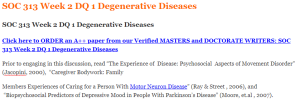SOC 313 Week 2 DQ 1 Degenerative Diseases
SOC 313 Week 2 DQ 1 Degenerative Diseases
Prior to engaging in this discussion, read “The Experience of Disease: Psychosocial Aspects of Movement Disorder” (Jacopini, 2000), “Caregiver Bodywork: Family
Members Experiences of Caring for a Person With Motor Neuron Disease” (Ray & Street , 2006), and “Biopsychosocial Predictors of Depressive Mood in People With Parkinson’s Disease” (Moore, et.al , 2007).
Additionally, review Chapter 3 in your text and watch the Andres Lozano: Parkinson’s, Depression and the Switch That Might Turn Them Off video. Review any relevant Instructor Guidance.
For this discussion, refer to the information in the “Introduction to the Miller Family” document. Ella’s father, Frederic, has Parkinson’s disease and is known in the family as the “shaky” grandpa. In 250-300 words, given what you know about the members of the family, analyze and comment on the potential effects this condition/illness might have on them. Select two individuals from different generations and analyze the similarities and differences in their perspectives on this condition from the lens of their stage of life and development. Explain the kinds of emotional and/or behavioral changes that might be expected. How might the various family members react to them?

SOC 313 Week 2 DQ 1 Degenerative Diseases Grading Rubric Guidelines
| Performance Category | 10 | 9 | 8 | 4 | 0 |
| Scholarliness
Demonstrates achievement of scholarly inquiry for professional and academic decisions. |
|
|
|
|
|
| Performance Category | 10 | 9 | 8 | 4 | 0 |
| Application of Course Knowledge –
Demonstrate the ability to analyze, synthesize, and/or apply principles and concepts learned in the course lesson and outside readings and relate them to real-life professional situations |
|
|
|
|
|
| Performance Category | 5 | 4 | 3 | 2 | 0 |
| Interactive Dialogue
Replies to each graded thread topic posted by the course instructor, by Wednesday, 11:59 p.m. MT, of each week, and posts a minimum of two times in each graded thread, on separate days. (5 points possible per graded thread) |
|
Summarizes what was learned from the lesson, readings, and other student posts for the week. |
|
|
|
| Minus 1 Point | Minus 2 Point | Minus 3 Point | Minus 4 Point | Minus 5 Point | |
| Grammar, Syntax, APA
Note: if there are only a few errors in these criteria, please note this for the student in as an area for improvement. If the student does not make the needed corrections in upcoming weeks, then points should be deducted. Points deducted for improper grammar, syntax and APA style of writing. The source of information is the APA Manual 6th Edition |
|
|
|
|
|
| 0 points lost | -5 points lost | ||||
| Total Participation Requirements
per discussion thread |
The student answers the threaded discussion question or topic on one day and posts a second response on another day. | The student does not meet the minimum requirement of two postings on two different days | |||
| Early Participation Requirement
per discussion thread |
The student must provide a substantive answer to the graded discussion question(s) or topic(s), posted by the course instructor (not a response to a peer), by Wednesday, 11:59 p.m. MT of each week. | The student does not meet the requirement of a substantive response to the stated question or topic by Wednesday at 11:59 pm MT. |
Also Read: SOC 313 Week 2 Assignment Biopsychosocial Paradigm, PIE, and Bronfenbrenner’s Ecological Theory

